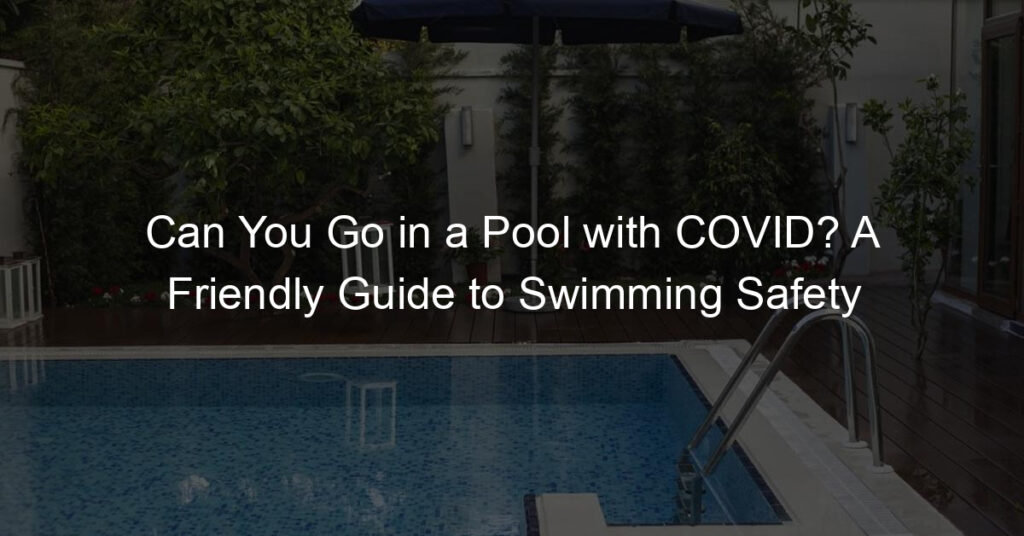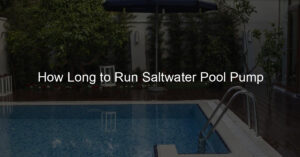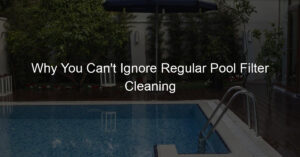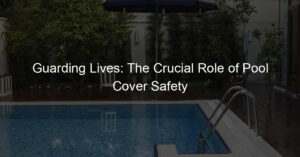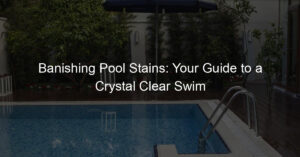Can You Go in a Pool with COVID? A Friendly Guide to Swimming Safety
As the COVID-19 pandemic continues to affect our daily lives, many people are questioning the safety of various activities, including swimming in pools. Experts have been researching the possibility of virus transmission in swimming pools, taking into consideration factors such as pool disinfection and safety guidelines. In this article, we will explore whether it is safe to go swimming in a pool while the COVID-19 pandemic persists.
The Centers for Disease Control and Prevention (CDC) states that there is no evidence that the virus causing COVID-19 can spread to people through water in pools. Proper water disinfection with chlorine or bromine should inactivate the virus. Therefore, the risk of catching the virus in a properly maintained pool is low. However, it is still crucial to follow safety guidelines, maintain good hygiene, and respect social distancing measures when visiting public pools or participating in swimming lessons.
Key Takeaways
- Properly maintained and disinfected pools are considered safe during the COVID-19 pandemic.
- Social distancing and hygiene measures remain essential to reduce the risk of transmission.
- Health authorities and pool operators play a vital role in ensuring a safe swimming environment.
Understanding COVID-19
As we know, COVID-19 is an infectious disease caused by the SARS-CoV-2 virus. This virus has impacted all aspects of our lives and has made us reevaluate daily routines and activities, including swimming in a pool. Here, I’ll be talking about the risks and safety measures regarding swimming in a pool during this pandemic.
First, let’s take a closer look at the SARS-CoV-2 virus. It primarily spreads through respiratory droplets when an infected person talks, coughs, or sneezes. These droplets can land in the mouths or noses of others nearby or be inhaled into the lungs. In some cases, the virus can spread by touching contaminated surfaces and then touching the face. However, research suggests that there is no evidence that COVID-19 can spread through water in swimming pools, hot tubs, or splash pads.
It is essential always to practice good hygiene and maintain physical distance while swimming, especially in a public pool. I’ve learned that properly maintaining water disinfection with chlorine or bromine should inactivate the virus in pools. This means that the risk of transmission through the water is minimal, if not nonexistent, when proper pool maintenance is followed.
Yet, we shouldn’t let our guard down. It is crucial to remember that the virus may still spread through close contact with other swimmers in and around the pool area. That’s why it is advised to stick to outdoor pools instead of indoor ones, as better air circulation can reduce the risk of transmission. Also, avoid swimming if you feel unwell or have any symptoms of COVID-19.
So in summary, I believe it is possible to enjoy swimming in a pool during the pandemic as long as we follow proper safety measures and remain cautious. Stay informed about the latest COVID-19 guidelines and adjustments by health authorities in your area, as this will help make better decisions regarding recreational activities like swimming. Stay safe, everyone!
Transmission and Spread
As I looked into the transmission and spread of COVID-19 in pool settings, I found some important facts that may be helpful for understanding the risks. First of all, there is no evidence that the virus that causes COVID-19 can be spread through water in swimming pools, hot tubs, or splash pads or through fresh or marine water such as in lakes, rivers, ponds, and oceans. This is because maintaining proper water disinfection with chlorine or bromine should inactivate the virus.
When it comes to person-to-person transmission, respiratory droplets are a primary means of spreading COVID-19. When an infected person talks, coughs, or sneezes, they release respiratory droplets containing the virus, which can enter the mouths or noses of people nearby. These droplets can also land on surfaces where others may touch them and then touch their mouth, nose, or eyes, indirectly transmitting the virus.
However, the pool itself is not the main source of concern. It’s the close proximity to other people in pool settings that presents a risk. Infectious disease experts point out that being in close contact with others at poolside gatherings, in locker rooms, or on pool equipment may increase the chances of transmission. To minimize the risk, it’s important to practice good hygiene, maintain physical distance from others, and avoid crowded areas.
To sum up the information, while the water in swimming pools is considered relatively safe due to disinfection measures, the spread of COVID-19 through respiratory droplets and person-to-person interactions in pool settings may still pose some risks. To stay safe, it’s essential to maintain good hygiene, keep distance from others, and be cautious in crowded areas.
Covid-19 and Pools
As a pool lover, I’ve been wondering whether it’s safe to go swimming during the COVID-19 pandemic. From the research I’ve done, it appears that the risk of catching the virus in a pool is quite low, provided certain precautions are taken.
Firstly, the CDC states that there is no evidence that the virus causing COVID-19 can spread through water in swimming pools, hot tubs, or splash pads. Moreover, proper water disinfection with chlorine or bromine should inactivate the virus in these settings. That’s a relief for us who love spending time in the pool.
In a pool setting, it’s also important to maintain social distancing and practice good hygiene. Avoiding crowded pools and staying at least 6 feet apart from others can help reduce the risk of infection. It’s also crucial to wash our hands frequently and avoid touching our faces.
Though the pool water itself might not pose a significant risk, shared surfaces in the pool area could still harbor the virus. It’s a good idea to sanitize frequently touched objects, like lounge chairs and handrails. Additionally, wearing a mask when not in the water can provide an extra layer of protection.
Remember that outdoor pools may offer a safer environment than indoor pools, as the open air can help disperse the virus to some extent. So, if I’m looking to cool off during the pandemic, I’d prefer to visit an outdoor pool.
In summary, although COVID-19 may be a concern, I can still enjoy swimming pools by taking appropriate precautions. By maintaining proper water disinfection, practicing social distancing, and following other safety measures, I can minimize the risk and continue to have fun in the pool.
Role of Disinfectants
I’ve learned that when it comes to swimming pools and preventing the spread of COVID-19, disinfectants such as chlorine and bromine play a significant role. These chemicals are commonly used in pools, hot tubs, and splash pads to maintain proper water quality and keep it safe for swimmers.
Chlorine and bromine have been found to inactivate the virus that causes COVID-19 in water. According to the CDC, there is no evidence that the virus can be spread through water in swimming pools or other recreational water sources, as long as proper disinfection levels are maintained. This is because these potent disinfectants can effectively neutralize the virus in the water.
Even though the risk of contracting COVID-19 through pool water is relatively low, I still believe it’s essential to clean and disinfect common touchpoints around the pool area. Disinfectant wipes or disinfecting wipes can be a handy tool for sanitizing surfaces like handrails, deck chairs, and door handles. By doing so, we help minimize the potential transmission of the virus outside the pool.
As a friendly reminder, if we’re taking a dip in the pool this season, let’s remember that maintaining proper water disinfection and diligently cleaning high-touch surfaces significantly reduces the risk of COVID-19 transmission. With these precautions in place, we can all enjoy a safer and more pleasant swimming experience.
Safety Guidelines from Health Authorities
As a responsible person, I always follow the safety guidelines provided by health authorities like the Centers for Disease Control and Prevention (CDC) and other local health officials. So, here are some guidelines to follow when going to a pool during the COVID-19 pandemic:
- The CDC states that COVID-19 is not known to spread in the water. However, exposure can happen in indoor spaces and through close contact with others.
- Operators and managers of public aquatic venues should collaborate with local health officials and follow federal, state, local, tribal, or territorial guidelines to reduce the spread of the virus.
- To maintain social distancing, I make sure to stay at least 6 feet apart from others at the pool. Facilities might have visual cues on the deck or in the pool to help with this.
- When at the pool, I wash my hands regularly with soap and water, as recommended by health experts.
- Facilities usually have rearranged furniture and signage to promote preventative measures and maintain a safe environment for pool-goers.
By following these safety guidelines from the CDC and local health officials, I can still enjoy my time at the pool while keeping myself and others around me protected from potential COVID-19 exposure.
Other Bodies of Water and Covid-19
As I was researching pools and COVID-19, I also looked into the risk of spreading the virus in other bodies of water like beaches, lakes, ponds, and oceans. Happily, I discovered that the virus is unlikely to spread through water in these environments.
According to the CDC, there’s no evidence that the virus that causes Covid-19 can spread to people through fresh or marine water. This means that going to the beach, whether it’s by the ocean or a lake, is less likely to pose a threat as long as we take standard safety precautions like maintaining physical distance and wearing a mask when we’re out of the water.
It’s also worth noting that natural water bodies like lakes, rivers, and oceans are vast and dynamic systems. Any virus that might end up in the water is likely to get diluted to a point where it’s no longer infectious.
One thing to keep in mind when enjoying these bodies of water, though, is to follow any local guidelines or restrictions that might be in place. Sometimes, specific beach areas may be closed due to concerns about overcrowding and the potential for transmission outside of the water.
In conclusion, it seems that the risk of contracting Covid-19 from swimming or spending time at beaches, lakes, and ponds is low. As always, it’s essential to stay informed, follow local guidelines, and enjoy these beautiful natural spaces responsibly.
Preventive Measures and Hygiene
As I’m heading to the pool during these COVID-19 times, I want to make sure I maintain a safe environment for myself and others. Here are some friendly tips and preventive measures I can follow to ensure everyone’s safety.
First and foremost, I should practice proper hand hygiene. Washing my hands with soap and water for at least 20 seconds is crucial, especially before entering the pool area and after touching any shared surfaces. Carrying a hand sanitizer with at least 60% alcohol is also a good idea when soap and water are not available.
Maintaining physical distancing is important too. I will ensure there are at least six feet between me and others while at the pool, whether on the deck or in the water. Social distancing can help minimize the risk of spreading the virus.
As tempting as it may be, I will not share any personal items such as towels, sunscreen, or pool toys with others who are not from my household. This helps keep germs from spreading between people and their belongings.
Wearing a mask is also essential, at least when I’m not in the water. Face coverings can protect me and those around me from respiratory droplets containing the virus. I’ll make sure to have a spare mask, just in case the one I’m wearing gets wet or dirty.
When it’s time to swim, I’ll try to avoid touching my face, especially my mouth, nose, and eyes. This prevents potential exposure to the virus through mucous membranes. Once I’m finished swimming, I will follow the same hygienic measures as before – washing my hands and wearing a mask.
By following these simple yet effective practices, I can ensure that both my pool experience and the health of those around me remain in good shape during the pandemic.
Role of Pool Operators and Lifeguards
As someone researching the safety of pools during the COVID-19 pandemic, I’d like to share my findings on the role of pool operators and lifeguards. It’s important to know that managers and operators of public pools and beaches should follow federal, state, local, tribal, or territorial guidelines and cooperate with health officials to ensure a safe environment for all. By doing so, they can minimize the risk of COVID-19 spreading among patrons.
Firstly, I found out that lifeguards play a crucial role in maintaining safety during this time. While their primary responsibility remains overseeing swimmers and preventing accidents, they are now challenged with adapting to new socially-distanced protocols. In many cases, lifeguards are required to wear face masks while on duty.
Pool operators and managers have several responsibilities as well, such as ensuring the cleanliness of the facility. They should implement frequent cleaning and disinfecting measures for high-touch surfaces such as handrails, pool ladders, and bathroom facilities. Additionally, pool operators might need to modify the layout of pool areas, such as spacing out deck chairs and creating zones for sunbathing, to promote social distancing among visitors.
Regarding pool toys and equipment, it’s essential for pool operators to establish a plan for their proper cleaning and use. Sharing of pool toys may be discouraged, or operators may choose to provide sanitized toys that are easily cleaned between users. Additionally, they should encourage patrons to bring their own toys or equipment for personal use.
In conclusion, pool operators and lifeguards play a significant role in ensuring the safety and well-being of swimmers during the COVID-19 pandemic. By adhering to guidelines and implementing preventive measures, they can provide a safer environment for everyone visiting the pool.
Covid-19 Impact on Swimming Lessons
Since the start of the Covid-19 pandemic, swimming lessons have been significantly impacted. Like many other activities, it has become necessary to adapt and find safe ways to continue enjoying one of my favorite pastimes. I’ve observed various changes in how swimming lessons are conducted during this time.
Firstly, the number of participants in swimming classes has been reduced to maintain social distancing. This helps to ensure the safety of both the instructors and students. Additionally, some swimming lessons have moved online, providing instructions and demonstrations through videos and live streaming.
I’ve noticed that instructors have increased their focus on personal hygiene and cleanliness. They often emphasize the importance of washing hands and using hand sanitizer before entering the pool area. Moreover, equipment like kickboards, noodles, and life vests are sanitized before and after each use.
Face masks have become a crucial part of swimming lessons as well. Instructors and students are required to wear masks while not in the water to limit the spread of Covid-19. Furthermore, I’ve observed that maintaining distance between swimmers is strictly enforced, with markers placed around the pool deck to remind everyone.
Lastly, I’ve seen changes in lesson scheduling as a result of the pandemic. Swimming classes might be offered less frequently or in smaller groups, while more time is allocated for cleaning and sanitizing the facilities between sessions. Communication with students and parents has also become a priority, with organizations keeping everyone informed about safety protocols and any adjustments related to Covid-19.
It’s clear that Covid-19 has had a considerable impact on swimming lessons. However, by following safety guidelines and adapting to the current situation, I’ve found that it’s still possible to enjoy learning and practicing this essential life skill in a safe and responsible manner.
Impact on Schools and Public Gatherings
During the pandemic, I noticed that many schools and public gatherings had to follow strict guidelines to ensure everyone’s safety. In the case of swimming pools, I found that the virus causing COVID-19 does not spread through water in pools, hot tubs, or splash pads, nor through fresh or marine water (lakes, rivers, ponds, oceans) 1. Therefore, the primary concern at pools became maintaining social distance to prevent the spread of the virus.
As stay-at-home orders started easing, schools and recreational facilities began to reopen their swimming pools, but they had to follow certain measures to ensure safety. Some of these measures included limiting the number of people, promoting a six-foot distance between people, and encouraging frequent handwashing and sanitization.
In public gatherings around pool areas, I observed that it was crucial to maintain social distancing, especially in the water, as wearing a mask while swimming wasn’t recommended 2. Furthermore, since a wet mask is less effective and may hinder breathing, it was a good idea to pack two masks when visiting the pool.
Even with the emergence of more contagious variants like the delta variant, I found that the pool itself was still considered a relatively safe place to be during this time 3. However, it was important to stay flexible with any plans involving public pools or water-based activities, as outbreaks might still pose a risk to safety.
In conclusion, the key to enjoying pool activities during the pandemic for schools and public gatherings was adhering to the recommended guidelines, maintaining appropriate social distancing, and following proper hygiene practices.
Conclusion
I would like to mention that there isn’t any evidence that the virus causing COVID-19 can spread through water in swimming pools, hot tubs, or fresh and marine water. So, I feel relatively confident about going for a swim. However, it’s essential to take necessary precautions around shared spaces like pool decks and locker rooms. Following guidelines from local health authorities can help minimize risks and ensure a safe swimming experience for everyone.
That being said, it’s important to remember that each individual’s situation might differ. So, before I dive in, I should pay close attention to general advice, operating decisions, and any announcements from local authorities. This information will help me make informed decisions about when and where it’s safe to go swimming during the ongoing COVID-19 pandemic.
I also learned that it’s helpful to maintain a friendly, positive attitude toward the situation. By being aware of my surroundings and respecting each other’s concerns, we can all contribute to creating a safe and enjoyable environment for swimming during these challenging times.
Frequently Asked Questions
Are indoor pools safe during the pandemic?
I think indoor pools can be considered safe during the pandemic as long as appropriate precautions are taken. This includes regular cleaning and disinfection of high-touch surfaces, maintaining physical distance, and wearing a mask when not in the water. Proper ventilation systems in indoor pool facilities can also reduce the risk of virus transmission.
Is swimming recommended for COVID recovery?
Swimming can be a good form of exercise for many people during their COVID recovery, as it is gentle on the joints and can help improve lung function. However, it is essential to listen to your body and consult with a healthcare professional before engaging in any exercise during the recovery process.
Does swimming worsen COVID-19 symptoms?
Swimming, like any other exercise, can potentially worsen COVID symptoms if you overexert yourself or if you have pre-existing respiratory conditions. It’s important to take things slow and listen to your body. If you experience any discomfort or worsening of symptoms while swimming, it’s best to stop and rest.
Is it safe to swim in public pools?
Yes, it is generally safe to swim in public pools during the COVID-19 pandemic. According to the CDC, there is no evidence that the virus can be spread through water in swimming pools when they are properly maintained (e.g., treated with chlorine or bromine). Make sure to follow local guidelines, maintain physical distance, and practice good hygiene to further reduce risks.
Can COVID-19 survive in saltwater pools?
The virus that causes COVID-19 has not been shown to survive in saltwater pools or other types of water, such as freshwater lakes, rivers, ponds, or oceans. Proper pool maintenance, including regular chlorination or other disinfection methods, can further neutralize the virus, providing a safe environment for swimming.
Is it okay to swim in my pool with COVID?
If you have COVID-19, it is not recommended to swim in your pool while you are contagious, as you may risk spreading the virus to others who share the pool. It is best to self-isolate and follow healthcare guidelines to prevent the spread of the virus. Once you have recovered and are no longer contagious, you can resume swimming in your pool.

